Key takeaways:
- Homelessness is often the result of systemic barriers and individual circumstances, highlighting the need for both immediate charity and long-term policy solutions.
- Advocacy for equitable policies is crucial to address the unique challenges faced by marginalized communities, demonstrated by personal stories that humanize the issue.
- Building coalitions and persistent communication with policymakers are effective strategies for driving meaningful policy change in homelessness.
- Advocacy fosters community empowerment and can lead to significant shifts in policy and public perception, emphasizing the importance of amplifying marginalized voices.
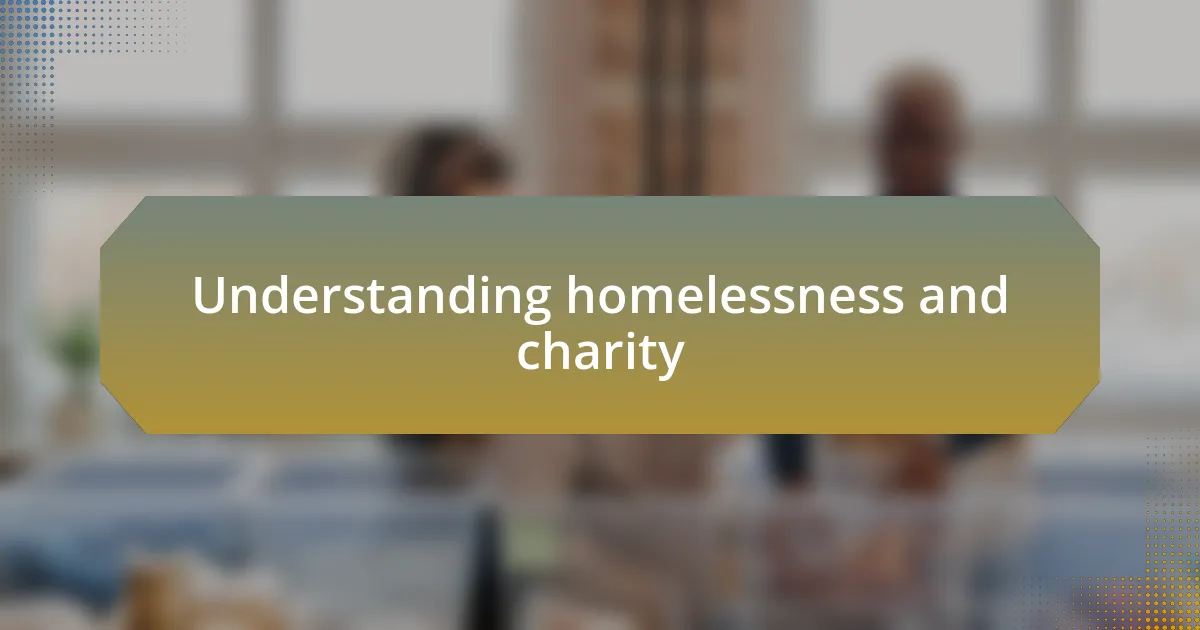
Understanding homelessness and charity
Homelessness is often a complex tapestry of individual circumstances, societal failures, and systemic barriers. I remember a night volunteering at a local shelter, where I met a young woman, Sarah, who had recently lost her job. Her story struck me deeply, as it exemplified how quickly life can change. Have you ever considered how a single setback could lead someone into the cycle of homelessness?
Charity plays a vital role in bridging the gap for those experiencing homelessness. When I’ve engaged with various organizations, I’ve seen firsthand the difference that targeted support can make. For example, one group I worked with not only provided meals but also offered job training programs—essentially giving people not just a fish, but a fishing rod. Isn’t it crucial to think about long-term solutions rather than just temporary relief?
The relationship between homelessness and charity is not without its complexities. While charitable efforts are undeniably important, I’ve often wondered whether they truly address the root causes. Reflecting on my experiences, I feel that understanding and advocating for equitable policies is paramount. After all, how can we effectively combat homelessness without addressing the systemic issues that contribute to it?
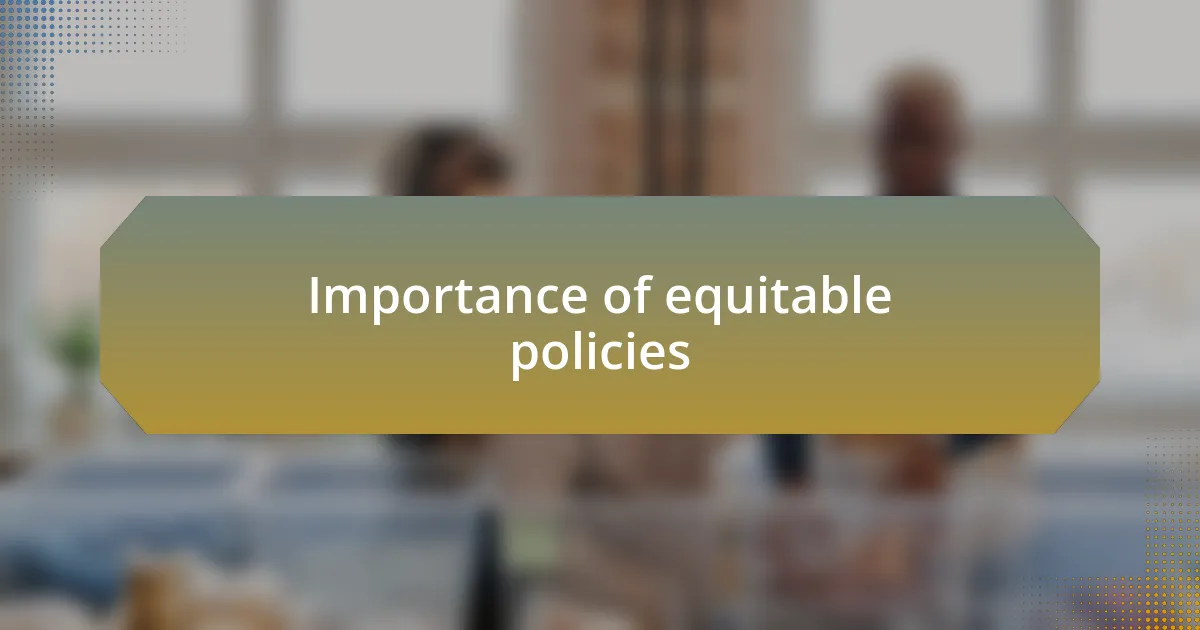
Importance of equitable policies
Equitable policies are essential in creating a society where everyone has access to opportunities and resources. I recall a time when I joined a community meeting focused on affordable housing initiatives. The passion in the room was palpable as people shared their stories, highlighting how unstable housing can derail lives. It made me realize that without an equitable approach, we risk perpetuating the very cycles of poverty that contribute to homelessness.
In my experience, advocating for fair policies means recognizing the unique challenges faced by marginalized communities. There was a point when I assisted a family who had been denied housing simply due to inconsistent credit history. This situation illustrated how systemic barriers can disproportionately affect individuals already struggling. Isn’t it disheartening to think that the very systems designed to protect can sometimes cause further harm?
Furthermore, equitable policies not only benefit those experiencing homelessness but enrich society as a whole. I once spoke with a local leader who emphasized that investing in accessible mental health services and job training not only lifts individuals but strengthens entire neighborhoods. When we create fair opportunities, we cultivate a robust community that moves forward together. Isn’t that something we should strive for?
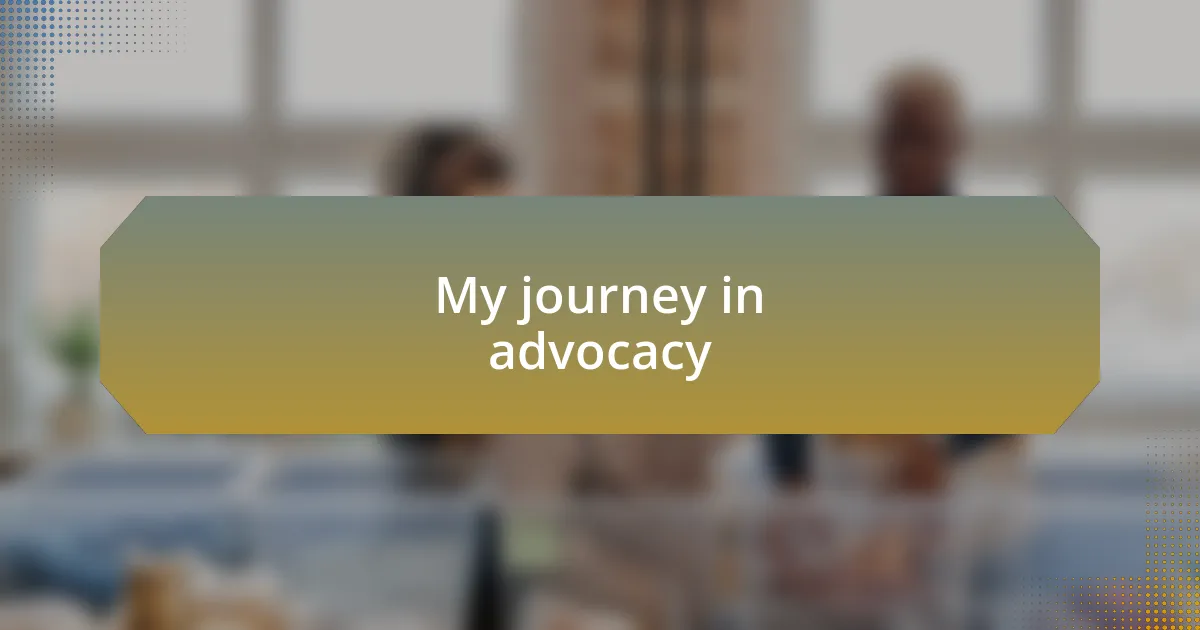
My journey in advocacy
My journey in advocacy began unexpectedly when I volunteered at a local shelter. While serving meals, I struck up conversations with residents who shared not just their struggles but also their dreams. Listening to their stories opened my eyes to the systemic barriers that kept them from thriving. It made me question: how can we as a society allow such potential to go untapped?
In another instance, I joined a rally advocating for increased funding for mental health resources. Standing shoulder to shoulder with those who believed in the cause ignited a fire within me. I’ll never forget the powerful speech from a former resident, who detailed how access to therapy transformed his life. It was a reminder that advocacy isn’t just about policy; it’s about real people with real stories.
As I navigated this journey, I often found myself reflecting on the broader impact of my actions. I once helped organize a workshop that connected individuals experiencing homelessness with legal aid services. Seeing their trust transform into hope as they realized they could reclaim their rights was a profound experience. It raised an important question: how can we not act when we have the capacity to change lives for the better?
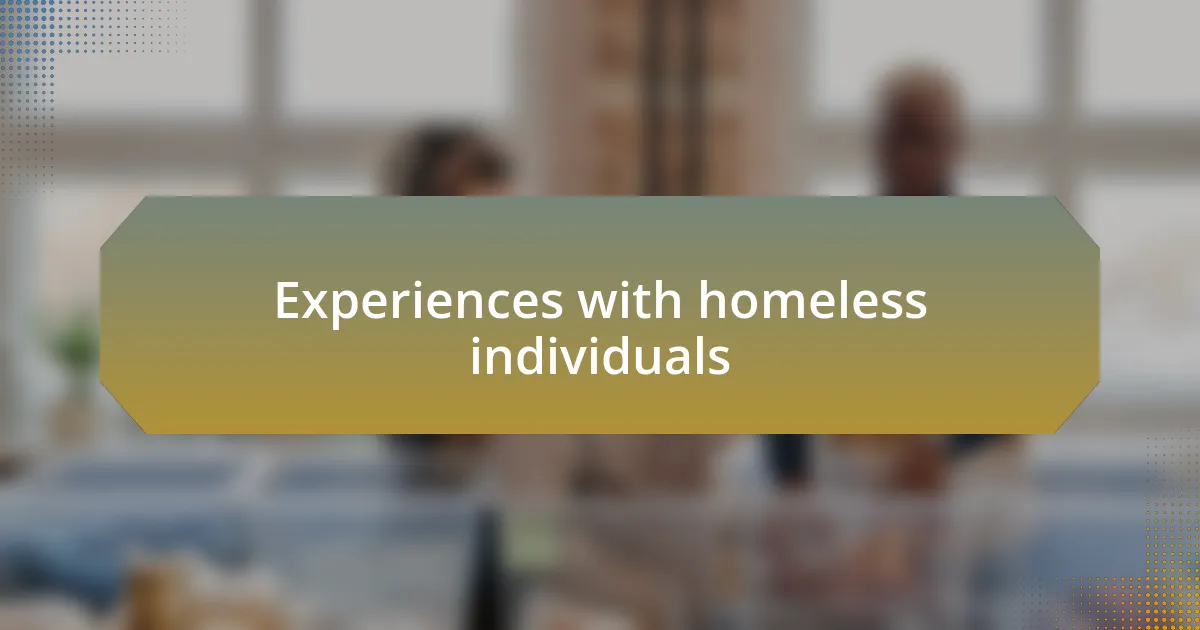
Experiences with homeless individuals
One day, while chatting with a man named Marcus at the shelter, I was struck by his warmth and humor despite his circumstances. He shared a story about his love for painting, which he had put aside after losing his home. It made me think: how many hidden talents lie beneath the surface of those we often overlook? That conversation not only deepened my understanding of his experience but also highlighted the creative potential that exists within everyone, regardless of their living situation.
I also remember meeting a woman named Sarah who had recently left an abusive relationship. As she opened up about her journey toward independence, I could see the flickers of resilience in her eyes. She spoke about the importance of community support, and it made me realize how crucial it is for individuals facing homelessness to feel valued and heard. What would it take for us to create more inclusive spaces where stories like hers are not just shared but celebrated?
In another encounter, I was moved by a group of young adults sharing their dreams on their feet, composing a song about hope and unity. Their creativity reminded me that even in dire circumstances, there’s an undeniable spark of life and aspiration. What if we harnessed that spirit to fuel our advocacy efforts? The insights I gained from these moments challenged me to consider how my advocacy can amplify the voices of those often silenced, ensuring that their dreams are not just preserved but nurtured.
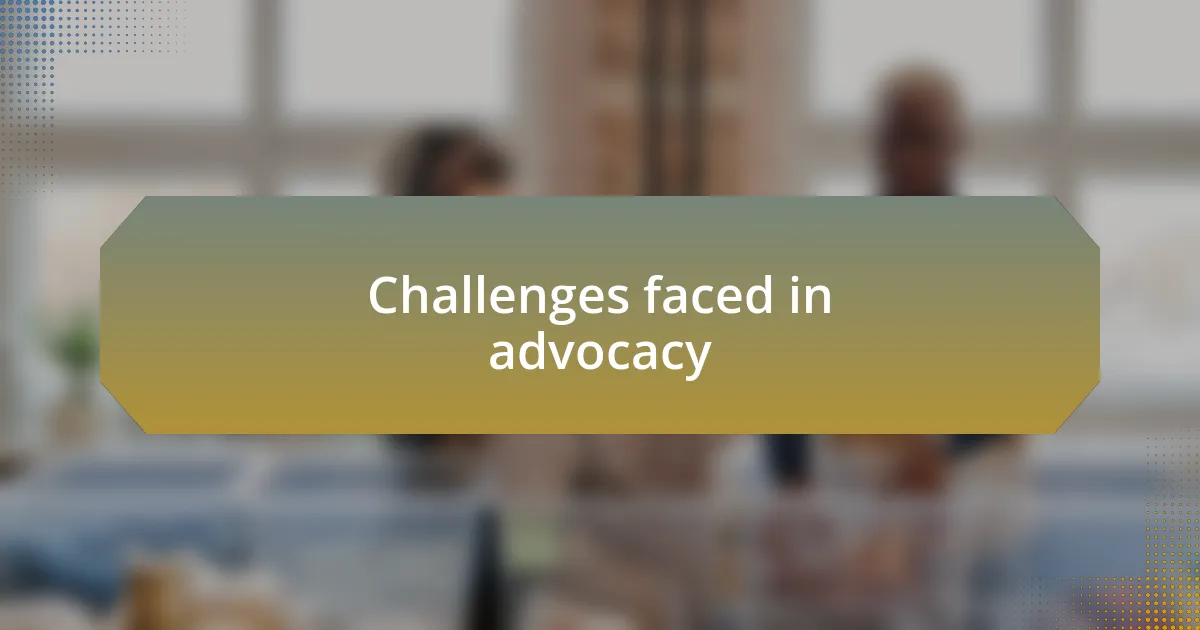
Challenges faced in advocacy
Advocacy isn’t simply about raising awareness; it comes with its own set of hurdles. I remember a project where I aimed to advocate for more affordable housing in our community. I encountered harsh resistance not just from policymakers, but also from community members who held misconceptions about homelessness. How do we bridge that understanding gap? The challenge lies in transforming perceptions and highlighting the human side of homelessness, which often feels like an uphill battle.
Another significant obstacle has been the emotional toll of advocacy work. There were nights when I couldn’t shake the anxiety after challenging discussions, especially when I felt my voice wasn’t making the impact I desired. Engaging with individuals whose lives hold so much pain can weigh heavy on the heart. Wouldn’t it be easier to turn away from the discomfort? Yet, I discovered that embracing those emotions is crucial for effective advocacy. It’s about tapping into empathy, which ultimately fuels my passion and perseverance in fighting for equitable policies.
Finally, the landscape of advocacy constantly evolves, making it difficult to maintain momentum. I once was part of a campaign that gained traction quickly, only to find it losing steam when competing social issues arose. How do we ensure the urgency doesn’t fade? I learned that setting tangible, short-term goals can help keep the focus sharp, reminding everyone involved that the fight for equitable policies is not only necessary but also achievable.
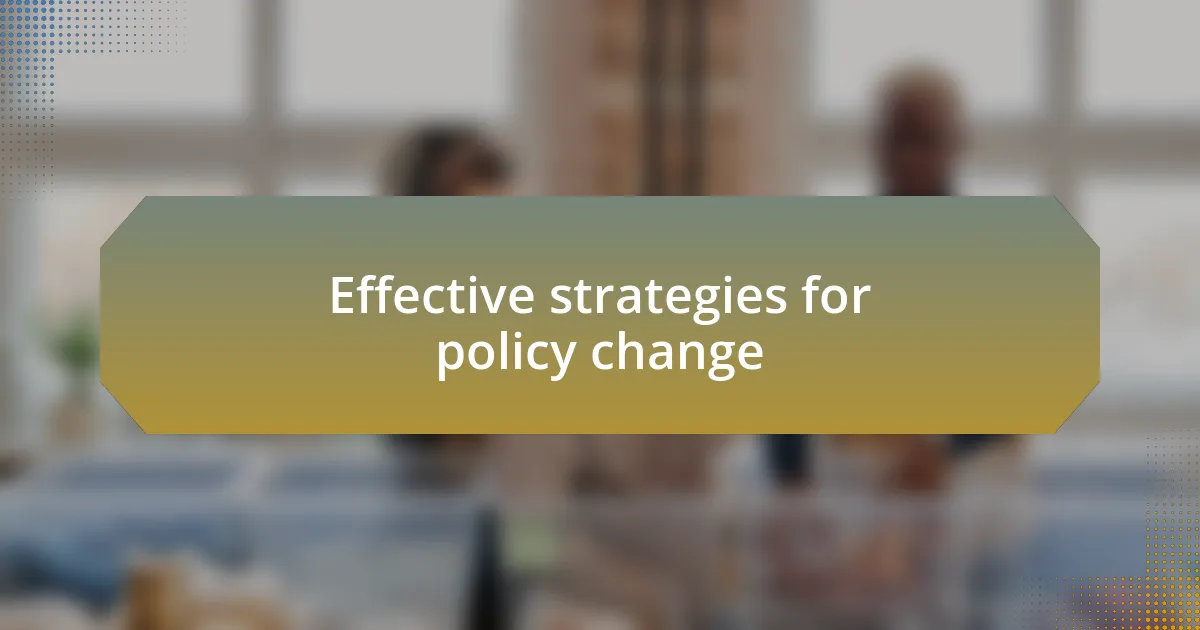
Effective strategies for policy change
To drive effective policy change, I found that building coalitions with other local organizations can amplify our voice. During one campaign, collaborating with a women’s shelter not only broadened our reach but also brought diverse perspectives to the table. It reminded me that shared goals can create a strong unified front, making it harder for policymakers to ignore us. Have you ever considered how collective strength can transform advocacy efforts?
Another strategy that proved invaluable was harnessing stories from those directly affected by homelessness. I remember meeting with a young man who had experienced homelessness firsthand. Sharing his experiences at community forums not only humanized the issue, but it also evoked empathy from the audience. Personal narratives have a unique power to resonate, and they often serve as a wake-up call for those who haven’t faced such challenges.
Finally, persistent communication with policymakers is crucial. I learned that frequent, transparent dialogue can uncover common ground, even with those who seem unsupportive initially. By consistently following up and presenting well-researched data, I noticed a shift in perspective over time. After all, patience is key in advocacy—real change rarely happens overnight. How do you maintain connections with those in positions of power?
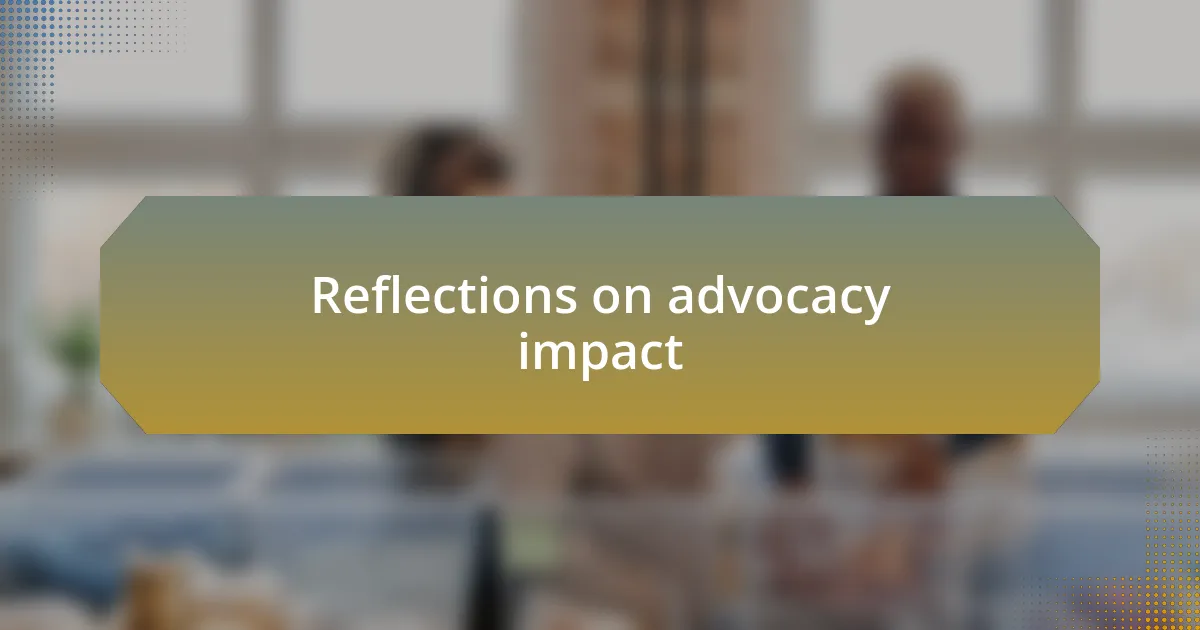
Reflections on advocacy impact
Advocating for equitable policies has profoundly impacted my perspective on community engagement. I remember attending a city council meeting where the voices of those we were fighting for were finally heard. The palpable shift in the room was inspiring, as community members spoke out about their needs. It made me realize that advocacy does more than influence policy; it fosters community empowerment and restores dignity. Have you ever witnessed the transformation that occurs when marginalized voices are amplified?
Reflecting on my experiences, I can’t help but feel a renewed sense of purpose each time a policy aligns more closely with the needs of those experiencing homelessness. One memorable moment was the passage of a local housing initiative I advocated for alongside residents. The joy on their faces as they celebrated felt like a personal triumph, reinforcing my belief that our efforts can lead to real change. It begs the question: how can we sustain this momentum and build on victories to ensure lasting impact?
In moments of frustration, when progress seemed slow, I learned to focus on the incremental wins. For instance, securing a small funding boost for supportive services provided a much-needed lifeline to several families. I often remind myself that advocacy is not a sprint but a marathon. How do you keep yourself motivated when facing setbacks? Each small victory fuels the larger journey toward equity and justice, reminding me that even the smallest changes can lead to significant ripple effects in communities.